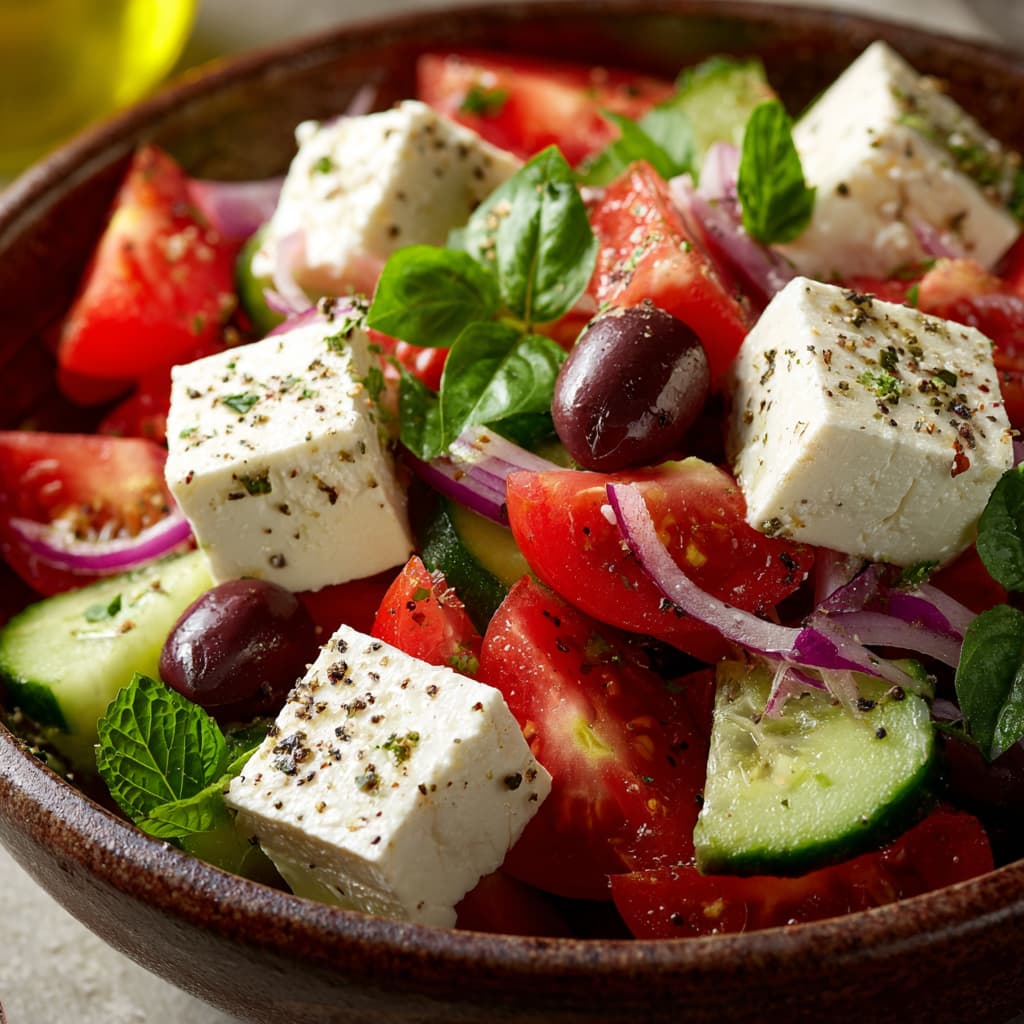If you’re craving something fresh, healthy, and bursting with bold flavor, look no further than the classic Greek salad. Known in Greece as Horiatiki (which means “village-style”), this timeless dish is a celebration of simple ingredients: juicy tomatoes, crisp cucumbers, briny olives, sharp red onions, and creamy feta cheese—all tossed in a vibrant olive oil dressing with oregano and lemon.
Perfect for summer lunches, mezze platters, or a refreshing side to grilled meats, the Greek salad is as versatile as it is satisfying. No lettuce, no fuss—just honest, seasonal ingredients that shine on their own.
Why You’ll Love This Greek Salad
-
No cooking required—fresh, raw ingredients only
-
Light yet satisfying—perfect for warm weather or healthy eating
-
Naturally gluten-free and vegetarian
-
Takes only 10–15 minutes to prepare
-
Pairs with almost any Mediterranean main dish
It’s the kind of salad that feels indulgent yet wholesome, bright yet earthy, simple yet full of flavor.
Traditional Greek Salad Ingredients
To stay true to the authentic version of Greek salad, keep it simple and skip the lettuce. Here’s what you’ll need:
Fresh Produce:
-
Tomatoes – ripe, juicy, and cut into wedges or chunks
-
Cucumbers – crisp and sliced into rounds or half-moons
-
Red onion – thinly sliced for sharpness and crunch
-
Green bell pepper – optional but traditional in Greece
Key Additions:
-
Kalamata olives – whole or pitted, deeply flavorful and briny
-
Feta cheese – traditionally served in a thick slab, not crumbled
-
Dried oregano – a must-have herb that defines the dish
-
Extra virgin olive oil – the base of the dressing
-
Red wine vinegar or lemon juice – for acidity
-
Salt & freshly cracked black pepper
Optional: Capers, anchovies, or fresh herbs like parsley or dill for extra depth.
How to Make Greek Salad
Step 1: Prepare the Vegetables
-
Cut tomatoes into wedges or bite-sized chunks.
-
Slice cucumbers (peeling is optional).
-
Thinly slice the red onion and green pepper.
Step 2: Assemble the Salad
-
In a large bowl, combine tomatoes, cucumbers, onion, pepper, and olives.
-
Gently toss with olive oil, vinegar or lemon juice, salt, and oregano.
Step 3: Top with Feta
-
Place a thick slice or slab of feta cheese right on top (not crumbled).
-
Sprinkle with extra oregano, a pinch of salt, and a drizzle of olive oil.
Step 4: Serve Immediately
-
Serve as-is or with warm pita bread, grilled meat, or other mezze dishes.
Pro Tips for the Best Greek Salad
-
Use ripe, seasonal tomatoes for the most flavor.
-
Don’t skip the olive oil—it’s essential to the dressing’s richness.
-
Soak red onions in cold water for 10 minutes to mellow their bite.
-
Keep the feta in a block for a more traditional presentation and creamier texture.
-
Let the salad rest for 5–10 minutes before serving to let the flavors meld.
Greek Salad Variations to Try
While traditional Horiatiki is minimalist, here are fun ways to mix it up:
Greek Salad with Lettuce
Not traditional, but popular in modern versions. Use romaine for extra crunch.
Greek Quinoa Salad
Add cooked quinoa for protein and a grain base—great for lunch bowls.
Grilled Greek Salad
Char your veggies (especially bell peppers and onions) for a smoky twist.
Vegan Greek Salad
Use a vegan feta alternative or marinated tofu cubes.
Greek Pasta Salad
Add cooked pasta to the base salad—fusilli or orzo work great for BBQs and potlucks.
These creative spins help you enjoy Greek flavors in new ways year-round.
What to Serve with Greek Salad
Greek salad pairs beautifully with many Mediterranean and Middle Eastern favorites:
-
Grilled meats: Chicken souvlaki, lamb chops, beef kebabs
-
Seafood: Grilled shrimp, calamari, or lemon herb fish
-
Vegetarian mains: Stuffed grape leaves, falafel, or eggplant moussaka
-
Carbs: Pita bread, rice pilaf, or roasted potatoes
-
Spreads: Tzatziki, hummus, baba ghanoush
Whether part of a mezze spread or served as a light entrée, Greek salad is incredibly versatile.
Make-Ahead and Storage Tips
-
Make-ahead: Chop the veggies and store separately. Assemble just before serving.
-
Dressing: Can be made up to 3 days ahead and stored in the fridge.
-
Leftovers: Best enjoyed within 24 hours. Tomatoes may release water over time—drain if needed.
-
Don’t freeze—the fresh vegetables and cheese don’t hold up well.
Greek salad is best served fresh, but with smart prep, it’s easy to enjoy on busy days.
Nutritional Highlights
Greek salad is more than delicious—it’s good for you, too:
-
Rich in fiber and antioxidants (thanks to tomatoes, onions, and cucumbers)
-
High in healthy fats from extra virgin olive oil
-
Calcium and protein from feta cheese
-
Low in carbs, making it ideal for low-carb and keto diets
-
Naturally gluten-free and vegetarian
It’s a great way to enjoy a nutrient-dense meal that feels light and energizing.
Greek Salad for Entertaining

This salad is ideal for gatherings and entertaining:
-
Beautiful presentation with bold colors
-
Easy to scale up for a crowd
-
Pairs with nearly any menu
-
No mayo or dairy-heavy dressing—perfect for warm weather
-
Travel-friendly: Can be assembled in a dish and brought to picnics or potlucks
Add it to your menu for Easter, summer BBQs, bridal showers, or weeknight dinners.
The Origins of Greek Salad: A Village Tradition
The traditional Greek salad, or Horiatiki, has humble roots in the rural villages of Greece. Farmers would gather whatever vegetables were in season—ripe tomatoes, cucumbers, onions, and olives—and toss them together with a slab of feta and olive oil.
There were no fancy dressings or additives, just honest, locally grown ingredients. Today, it’s served in restaurants around the world, but the soul of the dish remains the same: freshness, simplicity, and balance.
Greek Salad as a Light Main Course
Don’t think of it as just a side dish—Greek salad can easily stand on its own as a light, refreshing meal:
-
Add grilled chicken or shrimp for extra protein
-
Serve it with hummus and pita for a satisfying vegetarian lunch
-
Top it with hard-boiled eggs or a scoop of quinoa for a filling meat-free bowl
-
Use it as a base for a Mediterranean-style grain bowl
It’s perfect for hot days, quick lunches, or low-carb meal plans.
Olive Oil: The Heart of Greek Flavor
A good extra virgin olive oil is essential to authentic Greek salad. It’s not just a dressing—it’s a core flavor element.
Look for:
-
Cold-pressed olive oil from Greece or the Mediterranean
-
A peppery or fruity taste profile
-
A deep golden-green color
Drizzle generously. The oil coats the vegetables and brings out their flavors, making every bite more delicious. In Greek households, it’s normal to mop up the leftover oil and juices with bread—it’s that good.
Feta Cheese: Block vs. Crumbled
In authentic Greek salad, feta is always served as a thick slab on top—not crumbled. Here’s why:
-
It preserves the texture and moisture
-
You can crumble it yourself as you eat, allowing you to control the flavor balance
-
It’s more visually striking and traditional
Look for PDO-certified Greek feta made from sheep’s milk or a mix of sheep and goat milk. It has a briny, tangy bite that elevates the entire salad.
Perfect Pairings: Drinks to Enjoy with Greek Salad
Greek salad’s bold, fresh flavors call for crisp, clean beverages. Try:
-
White wine: Assyrtiko, Sauvignon Blanc, or Pinot Grigio
-
Rosé wine: Light and dry, perfect for summer
-
Sparkling water with lemon for a non-alcoholic pairing
-
Greek iced coffee (frappé) as a fun lunch combo
-
Lemonade or herbal tea for afternoon meals
These drinks highlight the salad’s freshness without overpowering it.
Greek Salad for Meal Prep and Lunchboxes
This salad is surprisingly meal-prep friendly:
-
Chop veggies ahead of time, store in airtight containers
-
Keep dressing separate until ready to eat
-
Pack feta and olives on top to keep everything crisp
-
Great for work lunches, school lunches, or road trips
It’s a no-wilt, no-soggy-lettuce salad that actually improves as it rests.
Cultural Significance: A Symbol of Greek Hospitality
In Greek culture, food is deeply tied to hospitality and family. Greek salad is often one of the first dishes brought to the table when guests arrive. It’s meant to be shared—placed in the center of the table, forked communally, and enjoyed slowly.
Making this salad at home is more than preparing a dish—it’s embracing a way of life rooted in generosity, seasonality, and simplicity.
Serve It Alongside Creamy Mediterranean Dishes
Greek salad is light, refreshing, and perfectly balanced. But if you’re looking to make it part of a full meal, pair it with a warm, creamy dish or a rustic toast for maximum Mediterranean flair.
Try our Grilled Halloumi and Avocado Toast: A Creamy and Savory Delight — the combination of grilled cheese, creamy avocado, and crusty bread makes a fantastic contrast to the freshness of Greek salad. Together, they create a colorful and nourishing lunch or dinner spread that tastes like summer in every bite.
Hosting Idea: Build-Your-Own Greek Salad Bar
Planning a party or casual dinner? Turn Greek salad into a fun DIY experience:
-
Offer bowls of chopped cucumbers, tomatoes, peppers, onions, olives, and feta
-
Provide add-ons like grilled chicken, chickpeas, hummus, pita chips, or artichokes
-
Include a few different dressings—olive oil vinaigrette, lemon tahini, or yogurt dill
-
Let guests build their own plates with their favorite ingredients

Greek Salad Recipe: A Crisp, Colorful, and Classic Mediterranean Favorite
- Total Time: 15 minutes
- Yield: 4 servings
Description
Crisp, colorful, and bursting with Mediterranean flavor—this Greek salad is a timeless favorite! Packed with juicy tomatoes, crunchy cucumbers, tangy olives, and creamy feta, it’s a light yet satisfying dish for any occasion.
Ingredients
For the salad:
-
Cherry tomatoes or ripe tomatoes (chopped) 🍅
-
Cucumber (sliced or chopped) 🥒
-
Red onion (thinly sliced) 🧅
-
Kalamata olives 🫒
-
Green bell pepper (optional) 🫑
-
Crumbled or block feta cheese 🧀
-
Fresh oregano or parsley 🌿
For the dressing:
-
Olive oil 🫒
-
Red wine vinegar
-
Lemon juice 🍋
-
Garlic (minced) 🧄
-
Dried oregano
-
Salt & pepper
Optional add-ins:
-
Avocado 🥑
-
Chickpeas
-
Capers
Instructions
-
In a large bowl, combine tomatoes, cucumber, onion, olives, and bell pepper.
-
Gently fold in feta and sprinkle with fresh herbs.
-
Whisk dressing ingredients in a small bowl and pour over the salad.
-
Toss gently to coat and let sit for a few minutes to absorb flavors.
-
Serve chilled or at room temperature as a side or light meal.
Notes
Use block feta for a more authentic texture. Pairs beautifully with grilled meats or pita. Add grilled chicken or shrimp for a hearty main dish version!
- Prep Time: 15 minutes
- Cook Time: 0 minutes




